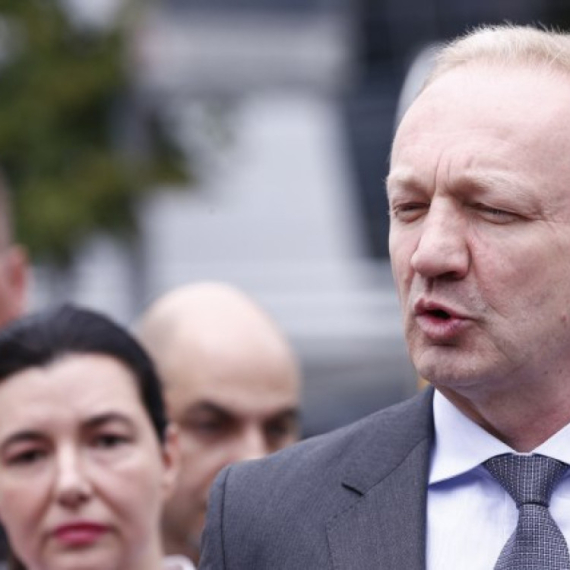Bosnian police reform deal in sight?
Bosnian leaders are set to agree Monday to push ahead with police reform, a diplomat said Saturday.
Sunday, 02.12.2007.
12:17

Bosnian leaders are set to agree Monday to push ahead with police reform, a diplomat said Saturday. Uniting Bosnia's ethnically divided police forces has been demanded by the EU as a condition for closer ties. Bosnian police reform deal in sight? Leaders of the country's semiautonomous Bosnian Serb Republic and a Croat-Bosniak Federation — are poised to move ahead with closer integration of the separate forces, the European diplomat told The Associated Press on condition of anonymity because of the sensitivity of the issue. The diplomat said the first part of the reform would include strengthening central police bodies, such as forensic and training services, which span the ethnic divide. Further reform will take place after the country's constitution is changed, he said. At the moment, each mini-state has had an independent police force. The diplomat said that, if agreement on the police reform is reached Monday, the EU would move ahead with initialing a Stabilization and Association Agreement with Bosnia — an important pre-membership accord — later in the week. Bosnia remains the only former Yugoslav state without such an agreement with the EU. Bosnia's journey toward EU membership will remain long and arduous. Among the Western Balkans nations striving for accession to the 27-nation bloc, only Croatia may be ready to join before the end of the decade, according to an EU report released earlier this month. All the others will need at least five years to prepare themselves economically and politically. EU Enlargement Commissioner Olli Rehn said in a statement Friday that he would travel to Sarajevo on Monday "to discuss with the Bosnian Presidency, the government and party leaders whether there is sufficient agreement on the police reform to initial the Stabilization and Association Agreement." On Friday, Bosnian Serb leaders dropped objections to a reform of parliamentary voting rules, in a step toward ending the most serious political crisis since the end of the 1992-95 Bosnian War. The leaders of Bosnia's main political parties and parliament agreed to support the reform, which was drawn up by the country's international administrator. The reforms will change the way a quorum is calculated, to make it more difficult for legislators and cabinet officers to block action simply by not showing up. Bosnia has been overseen by an administrator since the Dayton peace agreement that ended the 1992-95 Bosnian war and divided the country into the two mini-states. The current administrator, Slovak diplomat Miroslav Lajcak, is seeking to create a stable central government for both Serb and Bosnian-Croat sides of Bosnia.
Bosnian police reform deal in sight?
Leaders of the country's semiautonomous Bosnian Serb Republic and a Croat-Bosniak Federation — are poised to move ahead with closer integration of the separate forces, the European diplomat told The Associated Press on condition of anonymity because of the sensitivity of the issue.The diplomat said the first part of the reform would include strengthening central police bodies, such as forensic and training services, which span the ethnic divide. Further reform will take place after the country's constitution is changed, he said.
At the moment, each mini-state has had an independent police force.
The diplomat said that, if agreement on the police reform is reached Monday, the EU would move ahead with initialing a Stabilization and Association Agreement with Bosnia — an important pre-membership accord — later in the week. Bosnia remains the only former Yugoslav state without such an agreement with the EU.
Bosnia's journey toward EU membership will remain long and arduous. Among the Western Balkans nations striving for accession to the 27-nation bloc, only Croatia may be ready to join before the end of the decade, according to an EU report released earlier this month.
All the others will need at least five years to prepare themselves economically and politically.
EU Enlargement Commissioner Olli Rehn said in a statement Friday that he would travel to Sarajevo on Monday "to discuss with the Bosnian Presidency, the government and party leaders whether there is sufficient agreement on the police reform to initial the Stabilization and Association Agreement."
On Friday, Bosnian Serb leaders dropped objections to a reform of parliamentary voting rules, in a step toward ending the most serious political crisis since the end of the 1992-95 Bosnian War.
The leaders of Bosnia's main political parties and parliament agreed to support the reform, which was drawn up by the country's international administrator.
The reforms will change the way a quorum is calculated, to make it more difficult for legislators and cabinet officers to block action simply by not showing up.
Bosnia has been overseen by an administrator since the Dayton peace agreement that ended the 1992-95 Bosnian war and divided the country into the two mini-states.
The current administrator, Slovak diplomat Miroslav Lajčak, is seeking to create a stable central government for both Serb and Bosnian-Croat sides of Bosnia.
















Komentari 3
Pogledaj komentare